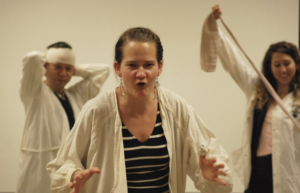
Join us for a panel on Behavioral XR on Thursday, June 3rd from 9:00 – 10:30 am PDT. The event will start with a one-hour panel discussion featuring Dr. Elizabeth McMahon, a psychologist with a private practice in California; Sarah Hill of Healium, a company developing XR apps for mental fitness based in Missouri; Christian Angern of Sympatient, a company developing VR for anxiety therapy based in Germany; and Marguerite Manteau-Rao of Penumbra, a medical device company based in California. This panel will be moderated by Dr. Walter Greenleaf of Stanford’s Virtual Human Interaction Lab (VHIL) and Dr. Christoph Leuze of the Stanford Medical Mixed Reality (SMMR) program. Immediately following the panel discussion, you are also invited to a 30-minute interactive session with the panelists where questions and ideas can be explored in real time.
Register here to save your place now! After registering, you will receive a confirmation email containing information about joining the meeting.
Please visit this page to subscribe to our events mailing list.
Sponsored by Stanford Medical Mixed Reality (SMMR)

Molecular Imaging in Neuroscience – MIPS Mini-Retreat
Hosted by: Dr. Michelle L. James, PhD
Sponsored by: Department of Radiology, Molecular Imaging Program at Stanford
The MIPS Mini-retreat series brings together members of the MIPS and greater School of Medicine community to discuss current opportunities for research and collaborations. During each mini-retreat we will discuss a different topic and we invite all those interested to attend. The mini-retreats are roughly two hours in length with ample time for discussion throughout. We hope you can join us and spark new collaborations!
Zoom Webinar Information
Webinar URL: https://stanford.zoom.us/j/92903233643
Dial: US: +1 650 724 9799 or +1 833 302 1536 (Toll Free)
Webinar ID: 929 0323 3643
Passcode: 146018
Tentative Agenda (all times are in PST)
8:00-8:05 AM – Opening Remarks – Michelle James, PhD
8:05-8:55 AM – Overview and Imaging-based Collaboration: Department of Neurology, Neurosurgery, Pathology, Psychiatry, and Nuclear Medicine (Frank M. Longo, MD, PhD, Michael Lim, MD, Thomas Montine, MD, PhD, Victor G. Carrión, MD, and Guido Davidzon, MD)
8:55-9:20 AM – Faculty Introductions: All interested MIPS faculty on the call give a 2-minute introduction including their interest in collaborating with Neurology, Pathology, Neurosurgery, and/or Psychiatry and Behavioral Sciences departments.
9:20-9:40 AM – Recent center proposals and possible mechanisms: UDALL Collaboration – Michelle James, PhD and Kathleen Poston, MD, MS
9:40-10:00 AM – Discussion – Moderated by: Michelle James, PhD and Katherine Ferrara, PhD

Radiology Department-Wide Research Meeting
• Research Announcements
• Mirabela Rusu, PhD – Learning MRI Signatures of Aggressive Prostate Cancer: Bridging the Gap between Digital Pathologists and Digital Radiologists
• Akshay Chaudhari, PhD – Data-Efficient Machine Learning for Medical Imaging
Location: Zoom – Details can be found here: https://radresearch.stanford.edu
Meetings will be the 3rd Friday of each month.
Hosted by: Kawin Setsompop, PhD
Sponsored by: the the Department of Radiology

MIPS Seminar Series: Predicting and Preventing Fetal and Neonatal Pathology: Looking Back and Looking Forward
David K. Stevenson, MD
The Harold K. Faber Professor of Pediatrics, Senior Associate Dean, Maternal and Child Health and Professor, by courtesy, of Obstetrics and Gynecology
Lucile Packard Children’s Hospital
Zoom Webinar Details
Webinar URL: https://stanford.zoom.us/s/94584828060
Dial: +1 650 724 9799 or +1 833 302 1536
Webinar ID: 945 8482 8060
Passcode: 481874
12:00pm – 12:45pm Seminar & Discussion
RSVP Here
ABSTRACT
The importance of minimally invasive technologies for interrogating the fetus and newborn, as well as of knowing where a biologic system is headed, not just where it has been, when trying to predict and prevent acquired diseases, will be discussed. Examples of such technologies, such as trace gas analysis and optical reporting of biologic phenomena, and their application to model systems and the human newborn will be presented. The role of advanced computational approaches for the integration and interpretation of large amounts of data derived from these new measurement tools will be emphasized.
ABOUT
Dr. David K. Stevenson is the Harold K. Faber Professor of Pediatrics and has made many impactful contributions to the field of neonatology and pediatrics, including his seminal studies on neonatal jaundice, bilirubin production and heme oxygenase biology. As a neonatologist, his research has focused primarily on neonatal jaundice and more recently on the causes of preterm birth and its prevention. He has held numerous leadership roles at Stanford University School of Medicine, including Vice Dean and Senior Associate Dean for Academic Affairs. He is currently the Senior Associate Dean for Maternal & Child Health, the Co-Director of the Stanford Maternal & Child Health Research Institute, and the Principal Investigator for the March of Dimes Prematurity Research Center at Stanford University. Dr. Stevenson has received many awards, including the Virginia Apgar Award, which is the highest award in Perinatal Pediatrics, the Joseph W. St. Geme, Jr. Leadership Award from the Federation of Pediatric Organizations, the Jonas Salk Award for Leadership in Prematurity Prevention from the March of Dimes Foundation, and the John Howland Medal and Award, the highest award in academic pediatrics. He has served as the President of the American Pediatric Society. In recognition of his achievements, Dr. Stevenson is a member of the National Academy of Medicine.
Hosted by: Katherine Ferrara, PhD
Sponsored by: Molecular Imaging Program at Stanford & the Department of Radiology

Alone in the Ring (a research-based theatre production about inclusive healthcare workplaces) is coming to campus during the Annual Stanford School of Medicine Diversity Week and National Disability Employment Awareness Month, SMAC and Stanford Medicine and the Muse hope to continue the discussion on how to spark and sustain change towards inclusive workspaces. Alone in the Ring is followed by a discussion between the team and audience members. During the presentation, audience members are encouraged to reflect: How inclusive is your workspace? How could you make it more accessible?

Office of Faculty Development and Diversity and SMAC.
The OFDD team welcomes all Stanford community members to join our inaugural Health Equity Action Leadership (HEAL Network) event, Health Equity Research in the Latinx Community, where faculty who do this work will share their experiences in a fireside chat panel.
Moderator: Lisa Goldman-Rosas
Speakers: Dr. Ken Sutha, Dr. Peter Poullos, Dr. Holly Tabor

MIPS Seminar Series: Title TBA
Steven Paul Poplack, MD
Professor of Radiology (Breast Imaging)
Stanford University Medical Center
Location: Coming soon!
12:00pm – 12:45pm Seminar & Discussion
RSVP: Coming soon!
ABSTRACT
Coming soon!
ABOUT
Coming soon!
Hosted by: Katherine Ferrara, PhD
Sponsored by: Molecular Imaging Program at Stanford & the Department of Radiology

MIPS Seminar Series: Title TBA
Matthew Bogyo, PhD
Professor of Pathology and of Microbiology and Immunology and, by courtesy, of Chemical and Systems Biology
Stanford University
Location: Coming soon!
12:00pm – 12:45pm Seminar & Discussion
RSVP: Coming soon!
ABSTRACT
Coming soon!
ABOUT
Dr. Bogyo received a B.Sc. degree in Chemistry from Bates College in 1993 and a Ph.D. in Biochemistry from the Massachusetts Institute of Technology in 1997. After completion of his degree he was appointed as a Faculty Fellow in the Department of Biochemistry and Biophysics at the University of California, San Francisco. Dr. Bogyo served as the Head of Chemical Proteomics at Celera Genomics from 2001 to 2003 while maintaining an Adjunct Faculty appointment at UCSF. In the Summer of 2003 Dr. Bogyo joined the Department of Pathology at Stanford Medical School and was appointed as a faculty member in the Department of Microbiology and Immunology in 2004. His interests are focused on the use of chemistry to study the role of proteases in human disease. In particular his laboratory is currently working on understanding the role of cysteine proteases in tumorgenesis and also in the life cycle of human parasites and bacterial pathogens. Dr. Bogyo currently serves on the Editorial Board of Biochemical Journal, Cell Chemical Biology, Molecular and Cellular Proteomics and is an Academic Editor at PLoS One. Dr. Bogyo is a consultant for several biotechnology and pharmaceutical companies in the Bay Area and is a founder and board member of Akrotome Imaging and Facile Therapeutics.
Hosted by: Katherine Ferrara, PhD
Sponsored by: Molecular Imaging Program at Stanford & the Department of Radiology

Roxana Daneshjou, MD, PhD
Assistant Professor, Biomedical Data Science & Dermatology
Assistant Director, Center of Excellence for Precision Heath & Pharmacogenomics
Director of Informatics, Stanford Skin Innovation and Interventional Research Group
Stanford University
Title: Building Fair and Trustworthy AI for Healthcare
Abstract: AI for healthcare has the potential to revolutionize how we practice medicine. However, to do this in a fair and trustworthy manner requires special attention to how AI models work and their potential biases. In this talk, I will cover the considerations for building AI systems that improve healthcare.


Mildred Cho, PhD
Professor of Pediatrics, Center of Biomedical Ethics
Professor of Medicine, Primary Care and Population Health
Stanford University
Title: Facilitating Patient and Clinician Value Considerations into AI for Precision Medicine
Abstract:
For the development of ethical machine learning (ML) for precision medicine, it is essential to understand how values play into the decision-making process of developers. We conducted five group design exercises with four developer participants each (N=20) who were asked to discuss and record their design considerations in a series of three hypothetical scenarios involving the design of a tool to predict progression to diabetes. In each group, the scenario was first presented as a research project, then as development of a clinical tool for a health care system, and finally as development of a clinical tool for their own health care system. Throughout, developers documented their process considerations using a virtual collaborative whiteboard platform. Our results suggest that developers more often considered client or user perspectives after changing the context of the scenario from research to a tool for a large healthcare setting. Furthermore, developers were more likely to express concerns arising from the patient perspective and societal and ethical issues such as protection of privacy after imagining themselves as patients in the health care system. Qualitative and quantitative data analysis also revealed that developers made reflective/reflexive statements more often in the third round of the design activity (44 times) than in the first (2) or second (6) rounds. These statements included statements on how the activity connected to their real-life work, what they could take away from the exercises and integrate into actual practice, and commentary on being patients within a health care system using AI. These findings suggest that ML developers can be encouraged to link the consequences of their actions to design choices by encouraging “empathy work” that directs them to take perspectives of specific stakeholder groups. This research could inform the creation of educational resources and exercises for developers to better align daily practices with stakeholder values and ethical ML design.